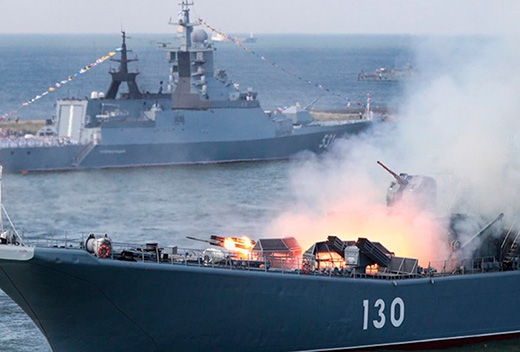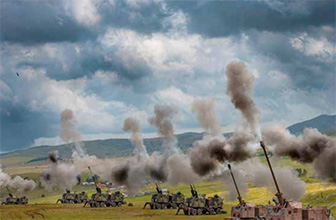Can Armenians Agree on a Unified Strategy?[Over]  By Yeghia TASHJIAN, Beirut-based regional analyst and researcher, columnist, "The Armenian Weekly” By Yeghia TASHJIAN, Beirut-based regional analyst and researcher, columnist, "The Armenian Weekly”
Over the past few weeks, I participated in multiple international and regional workshops and conferences in Europe and Russia and met with many European, Azerbaijani, Turkish, Iranian and Russian experts and politicians. These opportunities and encounters made me realize that we as Armenians must adapt to a new reality, revise our strategy (if we have one) and try to confront the dangers with the resources that we have. The possibility of a new war with Azerbaijan is very high, but proactive diplomacy and deterrence can postpone a major military clash.
I also realized a change in attitude in many Azerbaijani experts. Of course, we cannot generalize, but from their perspective, Azerbaijanis still firmly believe that the Nagorno-Karabakh crisis has been resolved, which the West and Russia do not agree on. They do not have enough leverage to force their will on Baku, as Azerbaijan is playing its energy card very well for now. Azerbaijanis have come to realize that if they enforce their will over Nagorno-Karabakh and engage in ethnic cleansing, there will be international backlash. READ MORE
Balancing the mediators - Armenia and Azerbaijan should avoid offending Russia[Over]  By Benyamin POGHOSYAN, PhD, Chairman, Center for Political and Economic Strategic Studies By Benyamin POGHOSYAN, PhD, Chairman, Center for Political and Economic Strategic Studies
The trilateral statement of November 10, 2020, which ended the 2020 Karabakh war seemed to sideline the US and France, who with Russia had for decades co-chaired the OSCE Minsk Group, from involvement in any post-war conflict settlement arrangements. It established instead a Russian monopoly in mediating future arrangements in the region. Neither Washington nor France was involved in preparing the November 10 statement, while the deployment of Russian peacekeepers in Nagorno Karabakh fomented the role of Russia as the only security provider for Nagorno Karabakh Armenians. Armenia, Azerbaijan, and Russia signed another trilateral statement on January 11, 2021, focused on restoring communications. The leaders' November 26, 2021, summit aimed to promote a border delimitation and demarcation process. In late 2021, the West started taking small steps to re-insert itself in the negotiation process, with the President of the European Council organizing the first Aliyev – Pashinyan summit in Brussels. READ MORE
The CSTO and Azerbaijan’s recent aggression against Armenia[Over]  By Benyamin POGHOSYAN, PhD, Chairman, Center for Political and Economic Strategic Studies By Benyamin POGHOSYAN, PhD, Chairman, Center for Political and Economic Strategic Studies
Azerbaijan launched a new, large-scale aggression against Armenia on September 13, and the absence of tangible actions by the CSTO to stop Azerbaijan’s attacks have reinvigorated discussions in Armenia about the country’s potential withdrawal from the CSTO. This recent wave of public discontent in Armenia about the CSTO coincided with a visit to Armenia by U.S. House Speaker Nancy Pelosi, which added a geopolitical component to the discussions, given the complete rupture of relations between the United States and Russia. On the very day of Azerbaijan’s aggression, Armenia officially appealed to the CSTO, based on article 4 of the treaty, asking for support, including by military means. READ MORE
The Geopolitical Background of Azerbaijan’s Aggression on Armenia[Over]  By Yeghia TASHJIAN, Beirut-based regional analyst and researcher, columnist, "The Armenian Weekly” By Yeghia TASHJIAN, Beirut-based regional analyst and researcher, columnist, "The Armenian Weekly”
Last week’s aggression by Azerbaijan on Armenia should be viewed from a regional lens, as the conflict imposes a new geopolitical reality not only on Armenia, but also Iran and the wider South Caucasus.
On September 10, 2022, the Defence Minister of Azerbaijan instructed his army to maintain combat readiness to “suppress any Armenian provocations.” Not surprisingly, three days later, Baku launched a full-scale aggression on Armenia’s eastern border, concentrating on Jermuk and using special forces, Israeli and Turkish-made drones and artillery strikes against military and civilian targets. Consequently, Azerbaijan occupied strategic positions near the border, exerting pressure on Armenia’s narrow southern region. The aim of this military operation was to enter Jermuk and force the authorities of Yerevan into another “capitulation.” READ MORE
The Ups and Downs in Iran Nuclear Deal Negotiations[Over]  By Benyamin POGHOSYAN, PhD, Chairman, Center for Political and Economic Strategic Studies By Benyamin POGHOSYAN, PhD, Chairman, Center for Political and Economic Strategic Studies
Since April 2021, Iran and other signatories of the 2015 nuclear deal (commonly known as JCPoA) have been engaged in active negotiations to restore it. President Biden’s administration declared its intention to move forward in that direction almost immediately after coming to power in January 2021. Many representatives of the Obama administration, who were personally involved in the negotiations from 2013 to 2015, received new positions in the Biden administration, and their desire to restore what they achieved in 2015 was quite understandable. Besides personal motives, the two and half years of the “maximum pressure campaign” against Iran launched by President Trump did not bring any tangible results. READ MORE
- September 27, 2022 08:29AM
The South Caucasus and the “Great Game” of Energy Security[Over]  By Yeghia TASHJIAN, Beirut-based regional analyst and researcher, columnist, "The Armenian Weekly” By Yeghia TASHJIAN, Beirut-based regional analyst and researcher, columnist, "The Armenian Weekly”
The “Great Game” was a political and diplomatic confrontation that existed for most of the 19th century and the beginning of the 20th century between the British Empire and the Russian Empire over Afghanistan and Central Asia, aiming to control trade routes in India. Almost a century later, with the dissolution of the Soviet Union, the “Game” returned, and a fierce competition arose between the Russians and the Americans and their Western allies to control the oil and gas fields and pipelines in the South Caucasus. READ MORE
- September 2, 2022 08:38AM
Do Armenia and Azerbaijan Move to Peace?[Over]  By Benyamin POGHOSYAN, PhD, Chairman, Center for Political and Economic Strategic Studies By Benyamin POGHOSYAN, PhD, Chairman, Center for Political and Economic Strategic Studies
In recent months, some positive momentum was registered in Armenia-Azerbaijan talks. The sides established national commissions on border delimitation and demarcation, and after a six-months break, the trilateral Armenia-Russia-Azerbaijan commission on restoration of communication resumed its work. According to Russian sources, later confirmed by the Armenian deputy prime minister, the sides achieved significant progress in the negotiations, almost reaching an agreement on the route of the highway, which will connect Azerbaijan with Nakhichevan via the Syunik region of Armenia, as well as on modalities of border and customs control. The agreement to open the Armenia-Turkey land border for the crossing of third country citizens and launch direct air cargo trade between the two countries, achieved during the July 1 meeting of Armenia and Turkey representatives, seemed to add a more positive environment in the South Caucasus geopolitics. READ MORE
Iran’s "Game of Drones" in the Middle East[Over]
 By Fuad SHAHBAZOV, Baku-based independent regional security and defence analyst By Fuad SHAHBAZOV, Baku-based independent regional security and defence analyst
Amid mounting domestic unrest and ongoing diplomatic standoffs with regional states, Iran has devoted a significant and increasing amount of national resources toward upgrading its national drone program. On May 17, the Iranian government officially inaugurated its first overseas drone factory in Dushanbe, Tajikistan; the facility manufactures the indigenous Ababil-2, a multipurpose drone model with reconnaissance, combat, and suicide capabilities. The Ababil-2 boasts a maximum range of 200 kilometres and can sustain roughly 90 minutes of flight time. The new drone factory will help Iran to improve relations with Tajikistan after a period of lingering diplomatic tension, and General Mohammad Bagheri described its inauguration as a turning point in bilateral military cooperation between the two countries. READ MORE
The Perils of Black Sea Security[Over]  By Eugene KOGAN, Tbilisi-based defence and security expert By Eugene KOGAN, Tbilisi-based defence and security expert
The unprovoked Russian invasion of Ukraine on February 24th, 2022 has substantially changed the security situation around the Black Sea. The three NATO member states Bulgaria, Romania, and Turkey have pursued a very different and distinct policy with regard to Russia. Bulgaria, as will be further presented, remains dependent on Russian gas and oil. Despite the recent Russian decision to halt gas exports to Bulgaria over the country’s refusal to pay for supplies in roubles, Bulgaria did not buckle under pressure. Romania maintains a watchful eye after the Russian military operations along the Black Sea coast, in general, and the city of Odessa, in particular. Turkey maintains balanced relations with Russia and Ukraine. READ MORE.
Lack of Results in Armenia-Azerbaijan Talks Can Quickly Lead to Renewed Violence[Over]
 By Fuad SHAHBAZOV, Baku-based independent regional security and defence analyst By Fuad SHAHBAZOV, Baku-based independent regional security and defence analyst
On May 12, the Foreign Ministers of Azerbaijan and Armenia held another meeting in Dushanbe, Tajikistan, on the side-lines of the Russia-led Commonwealth of Independent States Ministerial summit, and with the participation of the Russian foreign minister. Although Armenian Foreign Minister Ararat Mirzoyan characterized the meeting as another “productive interaction” between the warring parties, little progress has been made in the peace negotiations between Baku and Yerevan since the 6 April meeting of the leaders of the two countries in Brussels. READ MORE
Pashinyan and Aliyev Meet in Brussels Again: What Next[Over]  By Benyamin POGHOSYAN, PhD, Chairman, Center for Political and Economic Strategic Studies By Benyamin POGHOSYAN, PhD, Chairman, Center for Political and Economic Strategic Studies
On May 22, 2022, Armenian Prime Minister Pashinyan and Azerbaijani President Aliyev met in Brussels. The meeting was facilitated by the President of the European Council Charles Michel. For many observers, the May 22 trilateral meeting created a feeling of déjà vu. The same leaders were in Brussels less than two months ago. On April 6, 2022, Michel organized another meeting between Armenian and Azerbaijani leaders with the same sequence and results. Michel met separately with two leaders, then they held hours-long trilateral discussions, and late in the night, he published a statement summarizing the results. On April 6, participants discussed the same issues as on May 22 – the restoration of communications, the start of the border delimitation and demarcation process, and the launch of negotiations to sign a bilateral Armenia-Azerbaijan treaty. READ MORE
A Transitional Arrangement for Karabakh May Be Necessary[Over]  By Benyamin POGHOSYAN, PhD, Chairman, Center for Political and Economic Strategic Studies By Benyamin POGHOSYAN, PhD, Chairman, Center for Political and Economic Strategic Studies
The issue of the status of Nagorno Karabakh cannot be avoided in future discussions on an Armenia-Azerbaijan bilateral peace treaty. One solution is to agree to some transitional arrangement.
The April 6 Brussels meeting between Armenian Prime Minister Nikol Pashinyan and Azerbaijani President Ilham Aliyev gave the Armenia – Azerbaijan negotiations new momentum. The sides agreed to establish a border delimitation and demarcation commission and take steps to launch negotiations over the signature of a bilateral peace treaty. These issues were also agreed upon in principle back in November 2021, when two leaders had a meeting in Sochi facilitated by Russian President Vladimir Putin. READ MORE
Iran and the Second Karabakh War: Assessing the New Balance of Power in the South Caucasus[Over]
 By Fuad SHAHBAZOV, Baku-based independent regional security and defence analyst By Fuad SHAHBAZOV, Baku-based independent regional security and defence analyst
The second Karabakh war between Azerbaijan and Armenia in September of 2020 opened a new page in the modern history of the post-Soviet region and explicitly changed the geopolitical landscape in the South Caucasus. With Baku regaining control over large swathes of territories, Turkey has obtained a greater role in the region, acting as a guarantor of the ceasefire regime between Azerbaijan-Armenia alongside Russia, whereas Iran’s diminished position has gotten less attention. Indeed, in the post-war period, Tehran saw a steep decline in its regional influence in the Southern Caucasus, losing its direct land route to Armenia and facing the growing influence of Russia, Israel, and Turkey. Prior to the conflict, Iran had long pursued a balanced foreign policy in the region, developing a partnership with Armenia and Azerbaijan, respectively. However, Turkey’s close relations with Azerbaijan since the 1990s prevented Iran from establishing powerful leverage over this country, unlike landlocked Armenia, which has relied on Iran as one of the main economic partners. READ MORE
What is Next in Ukraine[Over]  By Benyamin POGHOSYAN, PhD, Chairman, Center for Political and Economic Strategic Studies By Benyamin POGHOSYAN, PhD, Chairman, Center for Political and Economic Strategic Studies
As large-scale hostilities continue in Ukraine, politicians, geopolitical experts and international media outlets seek to assess the outcomes and implications of the conflict. When Russia launched its “special military operation” on February 24, the widespread assumption was that Russia planned a blitzkrieg to take major Ukrainian cities within days or maximum weeks. The narrative changed as the first week of hostilities passed with no significant Russian successes. Experts and commentators started to claim that the Russian plan failed due to miscalculations and stiff resistance of the Ukrainians. According to these assessments, Russian President Vladimir Putin was misinformed by his advisors and generals, who promised him that many Ukrainians would meet Russian troops with flowers and that the “special military operation” would be an “easy evening walk.” According to this narrative, facing a different reality, at the beginning of March 2022, Putin started to look for ways out of the mess hastily and end the war. READ MORE
Risks and Opportunities of the Emerging South Caucasus Regional Order[Over]   Policy Recommendations from the 21st workshop of RSSC SG/PfP Consortium Policy Recommendations from the 21st workshop of RSSC SG/PfP Consortium
The Regional Stability in the South Caucasus Study Group (RSSC SG) was proud to resume its activities in a face-to face format in Rome, 7-10 September 2021. On that occasion, the Study Group discussed and subsequently agreed on a number of policy recommendations.
The second Karabakh war was the catalyst for massive changes in the South Caucasus. Certainly, the new territorial realities fit better the internationally recognized territories of both countries, but important challenges remain, making it important for the RSSC SG to meet to spur thinking on the way forward. The conflict was also an opportunity for other regional actors. Georgia deployed uncommon diplomacy and peace-making skills in the aftermath of the combat phase between Armenia and Azerbaijan. While Georgia demonstrated its ability at being an effective bridge between the two belligerents, Russia established itself as the essential arbiter and guarantor of a fragile ceasefire, and of purveyor of security for new lines of demarcation between Armenia and Azerbaijan. Turkey has not waited and sided with Azerbaijan in achieving and securing the new territorial realities. READ MORE
Successful Border Demarcation and Delimitation Process Crucial for a Final Peace Agreement [Over]
 By Fuad Shahbazov, Baku-based independent regional security and defence analyst By Fuad Shahbazov, Baku-based independent regional security and defence analyst
The current border tensions between Azerbaijan and Armenia are not the first and likely not the last. Given this, a successful border demarcation/delimitation process could be a crucial point in paving the way for a final peace agreement between the two adversaries. Therefore, the resumption of direct peace talks is the only rational option.
Last month, shortly after the first anniversary of the 44-day Karabakh war between Azerbaijan and Armenia, saw a new phase of violent hostilities, and the fighting was far from conventional. Deadly skirmishes occurred on the Azerbaijan–Armenia's international border, in a place named Giziltapa (Tsitserrnakar) near Syunik province. According to the Ministry of Defence of Azerbaijan, the tensions flared up due to the Armenian Armed Forces' intensive artillery fires at the positions of the Azerbaijani Armed Forces. In response, the Armenian Ministry of Defence accused the Azerbaijani side of provocation, violating international borders, and spreading disinformation regarding the skirmishes. READ MORE
What's behind the Fresh Tensions between Iran and Azerbaijan?[Over]
 By Fuad Shahbazov, Baku-based independent regional security and defence analyst By Fuad Shahbazov, Baku-based independent regional security and defence analyst
In the period immediately after the 44-day Karabakh war, Baku-Tehran relations remained on the level of pragmatic co-operation, until the new conservative political establishment ascended to power in Iran. Since then, Tehran’s rhetoric against Azerbaijan has shifted from that of “partnership” to open threats that explicitly neglect the partnership atmosphere. Relations between Baku and Tehran have always been unstable, particularly at the beginning of the 2000s. However, they rekindled when both countries became engaged in regional infrastructure and transit projects. READ MORE
- December 15, 2021 09:08AM
Assessing Armenians’ Geopolitical Situation [Over]  By Alan Whitehorn, Professor Emeritus in Political Science, The Royal Military College of Canada By Alan Whitehorn, Professor Emeritus in Political Science, The Royal Military College of Canada
Armenia is at yet another critical time. The war losses were substantial and impacted greatly. Violent Azerbaijani-Armenian border incidents continue, with property damage, military personnel injuries and deaths. The risks ahead are significant. Accordingly, it is crucial to assess the geopolitical situation that confronts Armenia, commencing first with key problems and challenges and then exploring some opportunities.
Amongst the pressing issues is the fact that demographically Armenia has far less manpower than Azerbaijan, even if women were conscripted too. Armenia’s population has been declining significantly due to outmigration and this pattern has been accelerating after the recent Karabakh war and various phases of the Covid pandemic. An army historically based on conscription needs to address its critical declining population base. READ MORE
Military Aerospace Expertise and Exports from Israel[Over]  By Eugene Kogan, Tbilisi-based defence and security expert By Eugene Kogan, Tbilisi-based defence and security expert
Local domestic military aerospace expertise has been honed over a period of almost 60 years. Israel’s procurement of US-built fighter aircraft and Israeli technicians and aeronautical engineers developing subsystems and avionics for the jets has enhanced their skills and expertise.
Rafael Advanced Defence Systems’ cooperation with Raytheon has taken military aerospace expertise to the next level. The triple combination of buying from the United States, developing subsystems locally, and teaming up with the US has contributed to successful arms exports from Israel. The Ministry of Defence International Defence Cooperation Authority (known as SIBAT) realised in November 2019 that the international arms market was undergoing serious changes and certain adjustments would be needed in order to remain competitive and increase the market share of Israeli defence companies. READ MORE.
Armenia’s Five Stages of Grief[Over]  By Benyamin Poghosyan, PhD, Chairman, Center for Political and Economic Strategic Studies By Benyamin Poghosyan, PhD, Chairman, Center for Political and Economic Strategic Studies
Todd Fabacher, Co-Founder, Distrikt Foundation, Gyumri
Countries, just like people, will experience the five stages of grief after a significant loss. 2020 was a challenging year for all nations. COVID – 19 pandemic and economic downturn have negatively impacted almost everyone. It was an exceptionally difficult year for Armenia because, besides the pandemic, defeat in the war launched by Azerbaijan against the unrecognized Nagorno Karabakh (Artsakh) Republic in autumn 2020 resulted in significant material and human losses. In the first half of 2021, Armenia grasped domestic political instability, triggering an early parliamentary election in June 2021. READ MORE
- September 4, 2021 06:14AM
Revolutionizing the Turkish Army under Erdogan[Over]  By Yeghia TASHJIAN, Beirut-based regional analyst and researcher, columnist, "The Armenian Weekly” By Yeghia TASHJIAN, Beirut-based regional analyst and researcher, columnist, "The Armenian Weekly”
Back in July, Rich Outzen published a policy paper “Deals, Drones and National Will: The New Era in Turkish Power Projection” in the Washington Institute for Near East Policy highlighting the new strategy of the Turkish Armed Forces, the development of the arms industry and how Ankara is deploying hard power in the region. According to Outzen, the integration of drones, electronic warfare, manoeuvre and precision strike employed by Turkey across technologies and domains (manned/unmanned and ground/air/naval) have been characterized as a new phase of a revolution in military affairs (RMA). An RMA is a hypothesis in military theory about the future of warfare, often connected to technological and organizational recommendations for radical military reform. An RMA occurs when new tactics, technologies and operational concepts enable dramatic increases in ineffectiveness to provide early innovators a marked advantage and force others to adopt the same methods. READ MORE
- September 4, 2021 06:12AM
Assessing the Current Situation in the South Caucasus[Over]  By Alan Whitehorn, Professor Emeritus in Political Science, The Royal Military College of Canada By Alan Whitehorn, Professor Emeritus in Political Science, The Royal Military College of Canada
Despite signing the November 9, 2020 ceasefire, Azerbaijan and Armenia have not been able to agree on an actual firm ceasefire. There are too many border incursions and military incidents, despite the existence of decades-old soviet boundaries between republics that were firmly regulated in the former Soviet Union. Peacekeepers are too few and not located in enough areas to address all of the border incidents. READ MORE
Israeli-Greek Naval, Air Force and Defence Industry Cooperation[Over]  By Eugene Kogan, Tbilisi-based defence and security expert By Eugene Kogan, Tbilisi-based defence and security expert
The bilateral Israeli-Greek military and defence industry cooperation was not created in a vacuum, but is a by-product of the steadily deteriorating Israeli-Turkish relations which include two important events: the famous World Economic Forum incident in Davos on January 29th, 2009 and the Mavi Marmara incident on May 31st, 2010. The Davos incident was further aggravated by the Mavi Marmara incident, which left ten Turkish citizens dead after clashing with Israeli commandos as the latter boarded the ship which was trying to break the Gaza blockade. Moreover, the military component of Israeli-Turkish relations, which used to be the backbone of the relations, is still missing and is unlikely to reappear in the near future. READ MORE.
The Causes of the Third Karabakh War[Over]  By Alan Whitehorn, Professor Emeritus in Political Science, The Royal Military College of Canada By Alan Whitehorn, Professor Emeritus in Political Science, The Royal Military College of Canada
Just when you think the war is over, it actually is not. Multi-generational families are haunted by the dead. There are too many displaced persons, multitudes of refugee children uprooted from schools and homes, and continued mistreatment of POWs. The major economic dislocations and massive war debts are part of the ongoing and mounting negative tally. The competing legal terms national self-determination vs territorial integrity are brandished about in fervent ideological battles that further entrench the hardened positions of two combatant sides. READ MORE
Border Incident Forces Armenians to Rethink Relationship with Russia[Over]  By Benyamin Poghosyan, PhD, Chairman, Center for Political and Economic Strategic Studies By Benyamin Poghosyan, PhD, Chairman, Center for Political and Economic Strategic Studies
The Azerbaijani military incursion into Armenian territory may have significant geopolitical implications. The muted reaction of the CSTO and Russia triggered another wave of anti-Russian sentiments in Armenia.
On 12 May 2021, news coming from the Syunik region shocked Armenian society. Several hundred Azerbaijani soldiers had crossed the Armenian border and penetrated up to 3.5 km into Armenian territory near the "Black Lake". The Armenian government did not confirm this immediately, however, late in the evening on the same day, Armenia’s Security Council convened in an extraordinary session, and the prime minister declared that Azerbaijani Armed forces had entered Armenian territory. READ MORE
|
|